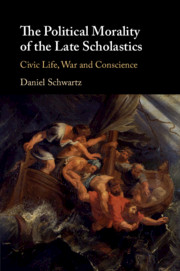Book contents
- The Political Morality of the Late Scholastics
- The Political Morality of the Late Scholastics
- Copyright page
- Dedication
- Contents
- Acknowledgements
- Abbreviations
- Introduction
- Part I Civic Life
- Part II War
- Chapter 6 Conscientious Objection in War: From Duty to Right
- Chapter 7 Patriotic Collaborationism: Demosthenes and Alexander
- Chapter 8 War and the Boundaries of Punitive Jurisdiction
- Chapter 9 Justice After Victory
- Concluding Remarks
- Bibliography
- Index
Chapter 8 - War and the Boundaries of Punitive Jurisdiction
from Part II - War
Published online by Cambridge University Press: 09 February 2019
- The Political Morality of the Late Scholastics
- The Political Morality of the Late Scholastics
- Copyright page
- Dedication
- Contents
- Acknowledgements
- Abbreviations
- Introduction
- Part I Civic Life
- Part II War
- Chapter 6 Conscientious Objection in War: From Duty to Right
- Chapter 7 Patriotic Collaborationism: Demosthenes and Alexander
- Chapter 8 War and the Boundaries of Punitive Jurisdiction
- Chapter 9 Justice After Victory
- Concluding Remarks
- Bibliography
- Index
Summary
- Type
- Chapter
- Information
- The Political Morality of the Late ScholasticsCivic Life, War and Conscience, pp. 161 - 182Publisher: Cambridge University PressPrint publication year: 2019

